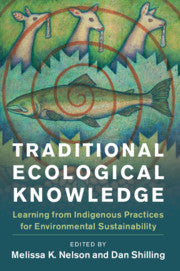Traditional Ecological Knowledge : Learning from Indigenous Practices for Environmental Sustainability
- Unit price
- / per
-
Author:NELSON Melissa / SHILLING Daniel
-
ISBN:9781108450447
-
Publication Date:June 2021
-
Edition:1
-
Pages:290
-
Binding:Paperback
-
Publisher:Cambridge University Press
-
Country of Publication:United Kingdom


A Back Order button means that we don’t have the book in stock at our store. It may already be on order – or we can order it for you from a publisher or distributor at no additional cost.
As we source items from around the globe, a back-order can take anywhere from 5 days to several weeks to arrive, depending on the title.
To check how long this might take, you’re welcome to contact us and we can provide an ETA or any other information you need. We recommend checking the timeframe before committing to an online order.
Traditional Ecological Knowledge : Learning from Indigenous Practices for Environmental Sustainability
- Unit price
- / per
-
Author:NELSON Melissa / SHILLING Daniel
-
ISBN:9781108450447
-
Publication Date:June 2021
-
Edition:1
-
Pages:290
-
Binding:Paperback
-
Publisher:Cambridge University Press
-
Country of Publication:United Kingdom
Description
NZ Content: Chapter 12. Home: resistance, resilience and innovation in Maori economies of well-being Rachel Wolfgramm, Chellie Spiller, Carla Houkamau and Manuke Henare
This book examines the importance of Traditional Ecological Knowledge (TEK) and how it can provide models for a time-tested form of sustainability needed in the world today. The essays, written by a team of scholars from diverse disciplinary backgrounds, explore TEK through compelling cases of environmental sustainability from multiple tribal and geographic locations in North America and beyond. Addressing the philosophical issues concerning indigenous and ecological knowledge production and maintenance, they focus on how environmental values and ethics are applied to the uses of land.
Grounded in an understanding of the profound relationship between biological and cultural diversity, this book defines, interrogates, and problematizes, the many definitions of traditional ecological knowledge and sustainability. It includes a holistic and broad disciplinary approach to sustainability, including language, art, and ceremony, as critical ways to maintain healthy human-environment relations.
Adding product to your cart
You may also like
A Back Order button means that we don’t have the book in stock at our store. It may already be on order – or we can order it for you from a publisher or distributor at no additional cost.
As we source items from around the globe, a back-order can take anywhere from 5 days to several weeks to arrive, depending on the title.
To check how long this might take, you’re welcome to contact us and we can provide an ETA or any other information you need. We recommend checking the timeframe before committing to an online order.
You may also like
You may also like
-
NZ Content: Chapter 12. Home: resistance, resilience and innovation in Maori economies of well-being Rachel Wolfgramm, Chellie Spiller, Carla Houkamau and Manuke Henare
This book examines the importance of Traditional Ecological Knowledge (TEK) and how it can provide models for a time-tested form of sustainability needed in the world today. The essays, written by a team of scholars from diverse disciplinary backgrounds, explore TEK through compelling cases of environmental sustainability from multiple tribal and geographic locations in North America and beyond. Addressing the philosophical issues concerning indigenous and ecological knowledge production and maintenance, they focus on how environmental values and ethics are applied to the uses of land.
Grounded in an understanding of the profound relationship between biological and cultural diversity, this book defines, interrogates, and problematizes, the many definitions of traditional ecological knowledge and sustainability. It includes a holistic and broad disciplinary approach to sustainability, including language, art, and ceremony, as critical ways to maintain healthy human-environment relations.
-
-
Author: NELSON Melissa / SHILLING DanielISBN: 9781108450447Publication Date: June 2021Edition: 1Pages: 290Binding: PaperbackPublisher: Cambridge University PressCountry of Publication: United Kingdom
NZ Content: Chapter 12. Home: resistance, resilience and innovation in Maori economies of well-being Rachel Wolfgramm, Chellie Spiller, Carla Houkamau and Manuke Henare
This book examines the importance of Traditional Ecological Knowledge (TEK) and how it can provide models for a time-tested form of sustainability needed in the world today. The essays, written by a team of scholars from diverse disciplinary backgrounds, explore TEK through compelling cases of environmental sustainability from multiple tribal and geographic locations in North America and beyond. Addressing the philosophical issues concerning indigenous and ecological knowledge production and maintenance, they focus on how environmental values and ethics are applied to the uses of land.
Grounded in an understanding of the profound relationship between biological and cultural diversity, this book defines, interrogates, and problematizes, the many definitions of traditional ecological knowledge and sustainability. It includes a holistic and broad disciplinary approach to sustainability, including language, art, and ceremony, as critical ways to maintain healthy human-environment relations.
-
Author: NELSON Melissa / SHILLING DanielISBN: 9781108450447Publication Date: June 2021Edition: 1Pages: 290Binding: PaperbackPublisher: Cambridge University PressCountry of Publication: United Kingdom
-



